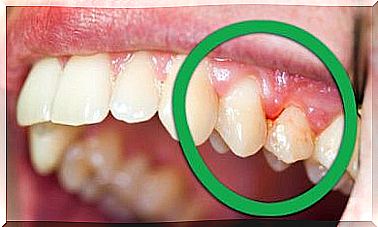Numbness In The Hands: Why Does It Happen?
Numbness in the hands may be due to a simple situation, such as cold, or be a symptom of a serious illness. Find out more in this article.

Numbness in the hands is a common and unpleasant sensation. This area of the body becomes rigid or inflexible and is accompanied by tingling.
This is a common cause for medical consultation. The problem is that its origin is very diverse and therefore it can be complicated to arrive at the correct diagnosis. In this article, we will explain everything you need to know about numbness in the hands and its most typical etiology.
What is numbness in the hands?
Numbness of the hands, as we have explained, is an alteration in the sensitivity and movement of that part of the body. The sense of touch is skewed and moving the fingers becomes inconvenient.
Often, in addition to a tingling, it is accompanied by a burning or tingling. Depending on its cause, the numbness will be either in the fingers, in one hand or in both.
A cause of numbness in the hands can be cold: this is quite common and usually does not lead to any consequences. However, according to a study carried out in Sweden, the condition that causes it most frequently is carpal tunnel syndrome. This study explains that one in five people who experience this symptom is probably suffering from this syndrome.

Causes of numbness in the hands
Numbness in the hands can be caused by a multitude of situations. It occurs because of an injury to the nerves (because they are compressed or injured, for example) that innervate the upper limb or because of systemic pathologies that have repercussions there.
However, it is also possible that the alteration occurs in the brain or spinal cord because these are two organs that coordinate both sensitivity and motor skills. These lesions are generally more serious and are often associated with obvious or debilitating symptoms.
Metabolic or infectious diseases, just like certain medical treatments, also drift into this situation. In the following paragraphs, we will explain the main causes of this problem in more detail.
Diseases of the brain and nervous system
Any pathology affecting the nervous system, in the event that it damages an area related to the hands, can cause numbness in the hands. This is for example the case of Guillain-Barré syndrome. This is a disorder in which the immune system attacks the cells of the nerves.
Numbness in the hands is one of its diagnostic symptoms. Cervical spondylosis is also linked to this numbness because it consists of wear and tear on the intervertebral discs, from which the nerves that go to the hands leave.
Injury from trauma or overuse
In this category we find the carpal tunnel syndrome that we talked about at the beginning. Here, the median nerve, which runs from the forearm to the fingers, compresses. There is therefore pain in the wrist, numbness, cramps and tingling.
Although this is the main cause, other syndromes and lesions can cause this numbness, such as cubital tunnel syndrome, where the compressed nerve is not the same. The same thing happens with brachial plexus injuries after an accident.
The final mechanism is usually that of squeezing or compression. The brain misinterprets signals from compressed nerves and sends indications of tingling, pain, and even paralysis to the hands.
Infectious diseases that cause numbness in the hands
Lyme disease is an infection that occurs from the bite of certain ticks. According to the Centers for Disease Control and Prevention, when treatment does not start in time, it is common to experience numbness in the hands.
Another pathology of infectious cause that can cause this symptom is syphilis. A phenomenon resembling that of the previous disease then occurs. If no treatment is given, it causes damage to the nervous system due to the development of the signs.
Chronic disorders
There are many diseases that, in the course of their development, end up damaging the nerves. The end result is then the alteration of sensitivity and motor skills. Diabetes is one of the most important and most common. It produces what’s called diabetic neuropathy , which the University of California says is associated with numbness in the hands.
Alcohol consumption, amyloidosis and multiple sclerosis are also chronic processes that affect the upper limbs. While it is true that cancer is not, in itself, the most common etiology of this symptom, chemotherapy is a combination of drugs with this adverse effect.

Other possible causes of numbness in the hands
The lymph nodes constitute another anecdotal fact. These are cysts that frequently appear in the joints, for example in the wrist. If they grow too large or put pressure on a nearby nerve, a numbing effect will be felt.
Also, vasculitis works by reducing blood flow to the palm of the hand and to the fingers. It is about inflammation of the walls of the arteries which reduce the caliber of the latter. Since there is less oxygen reaching the tissues, the tissues react with signs of injury.
When should you consult?
If you notice numbness in the hands, it is essential to see a doctor. He will have to carry out a physical examination and carry out additional examinations to reach a diagnosis.
As we have seen, the causes are varied and it is therefore possible that a diagnosis is not possible from the first moments. Giving a name to the disorder that bothers you will require some investigation. However, you do not need to worry because, in most cases, the causes can be perfectly resolved.









